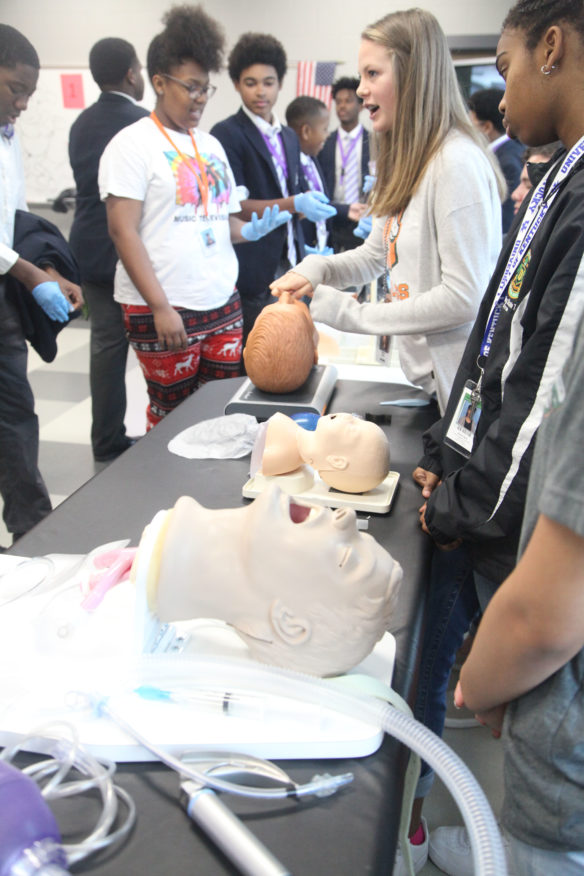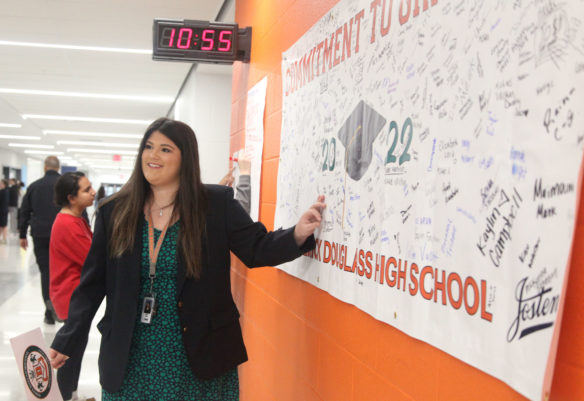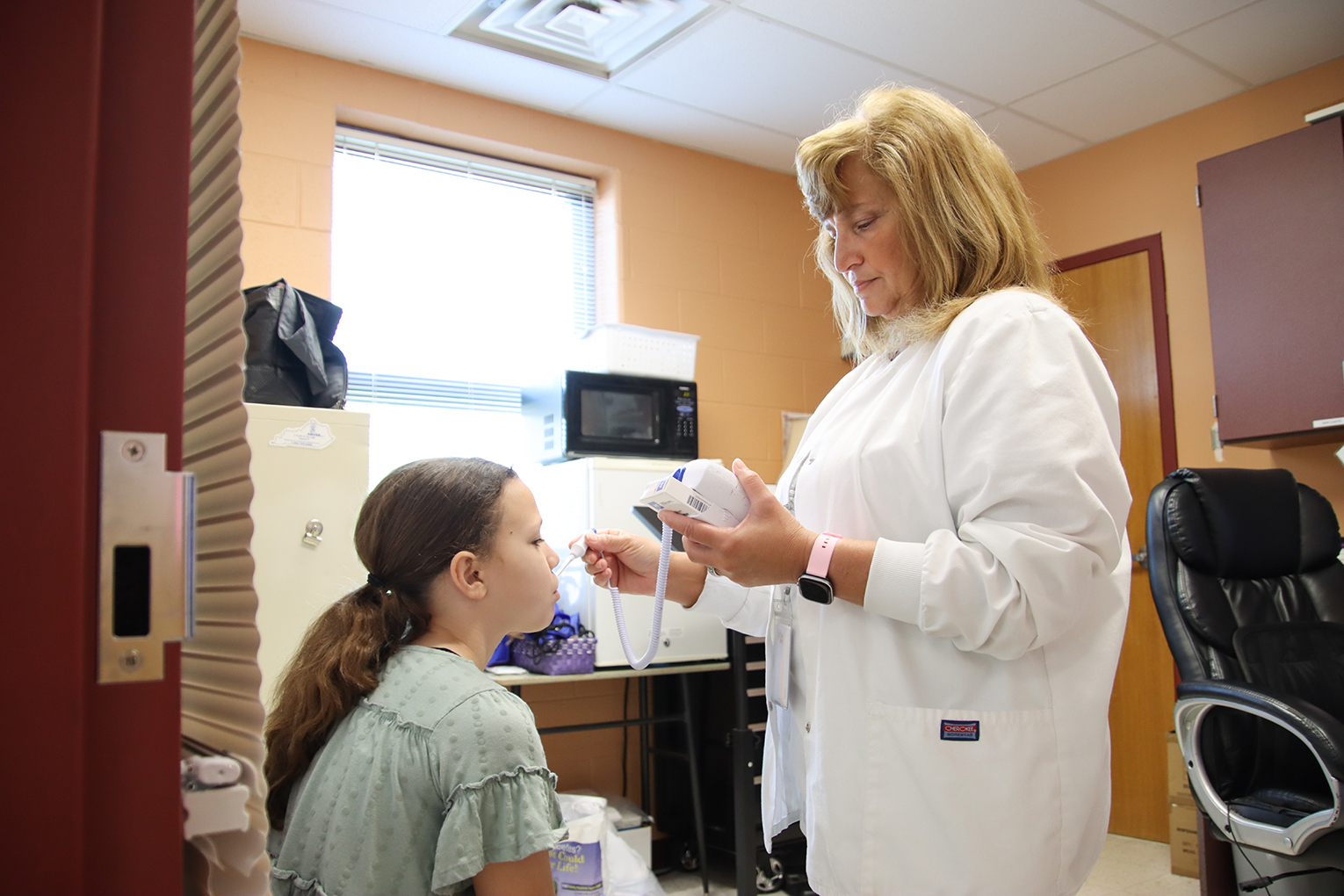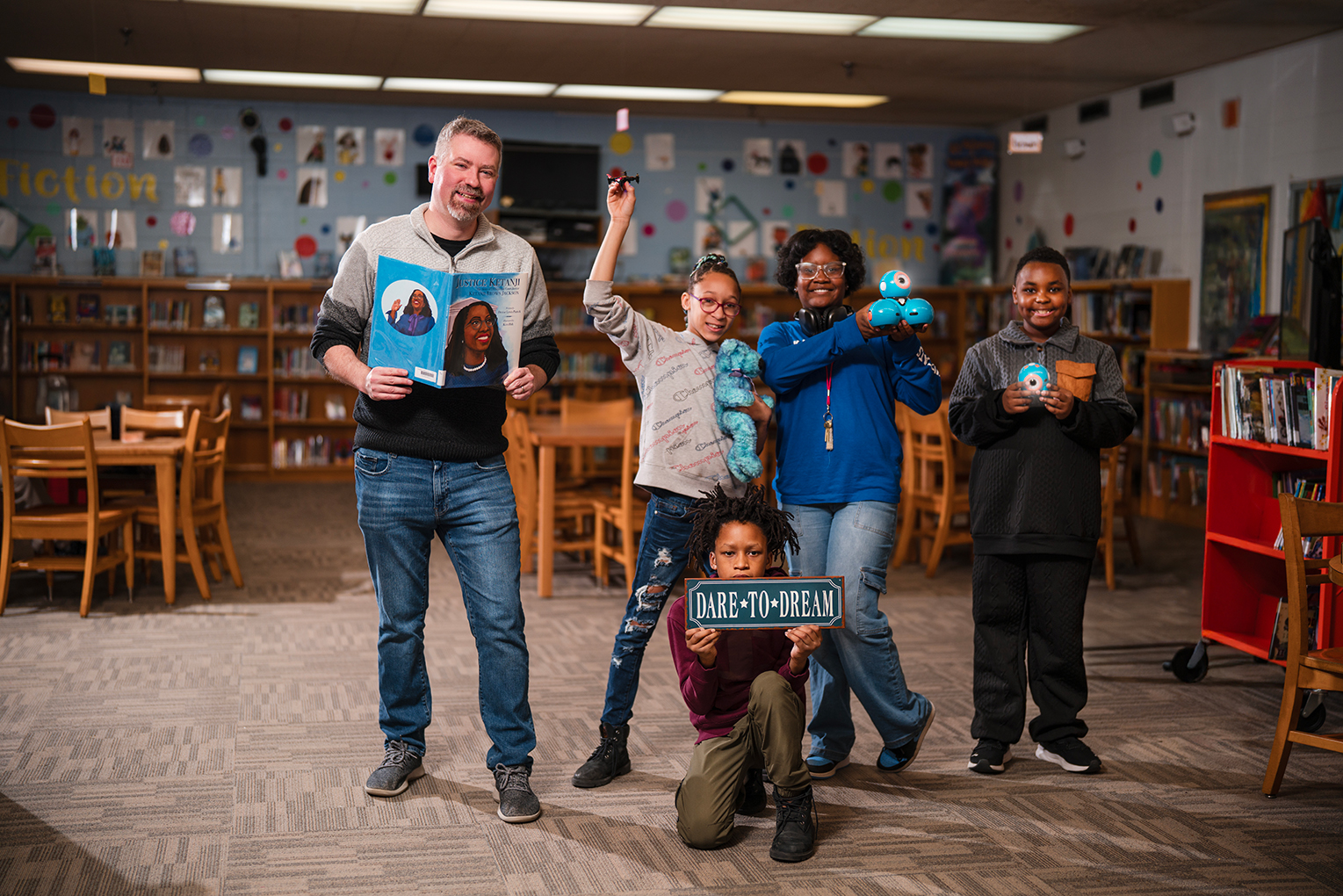
Naomi Frese, a student at Frederick Douglass High School (Fayette County), demonstrates some of the things students can learn in the Academy of Health Sciences, one of three career-themed pathways at the school. Frederick Douglass is one of three high schools in the district that are part of the Academies of Lexington, an initiative designed to prepare students for life after high school.
Photo by Megan Gross, Dec. 3, 2018
- The Academies of Lexington group students into small learning communities that are centered around common themes or experiences.
- A freshman academy at each of the schools helps students explore their interests and exposes them to career options.
By Mike Marsee
mike.marsee@education.ky.gov
At the Academies of Lexington, a freshman’s first day of high school could also be the first day of the rest of his or her life.
Day one for students in this innovative program at three Fayette County high schools is the start of a journey. It could lead them to a career that will help them succeed in a global economy and will, at the very least, lead to a richer and more interesting high school experience.
The academies – which are located within Bryan Station, Frederick Douglass and Tates Creek high schools – group students into small learning communities that are centered around common themes or experiences. They are intended to help students explore their own interests and to help make those students ready for life after high school.
The greater goal of the academies is what Shawn Hinds, the academy coach at Frederick Douglass High School, called “community prosperity,” or building a better community by growing students who are more prepared to find their place in it.
“It’s great for the kids, it’s great for the community,” Hinds said.
Kim Lyon, the strategic partnership manager in the Fayette County schools’ Office for School Leadership and Career and Technical Education, said the academies were born out of discussions with the local business community through Commerce Lexington, the local chamber of commerce, about what could be done to better prepare students for the workforce.
“We had a lot of people in business and industry say we need to be a better partner in that area,” Lyon said. “The educational model that we’ve used for many decades is not producing the workforce talent that business and industry is telling us is needed, so we’ve got to do something different.”
This initiative is a partnership between the school district and its stakeholders, which includes everyone from students and their families to educators and business, industry and community leaders. Ford Next Generation Learning – the educational arm of Ford Motor Co. – is a sponsor and consultant for the work.
According to the Academies of Lexington’s website, the project-based program prepares students for life after high school “by combining the academic rigor of college preparatory programs with the relevance of career-focused education.” The learning communities allow students to explore a field that interests them and provide a connection between the classroom and the real world.
Students at the three high schools may enter any of the three career-themed pathways – there are four each at Bryan Station and Tates Creek and three at Frederick Douglass – following their freshman year.
Their journey starts, however, in their school’s freshman academy, which is its own learning community with a dedicated principal and counselor.

Shelby Frazier, the senior class president at Frederick Douglass High School (Fayette County), shows visitors to the school a banner signed by members of the current freshman class as part of a commitment to graduation ceremony that will be displayed at their graduation in 2022. Freshmen at the three schools that are part of the Academies of Lexington are in their own academies that offer personal and career exploration and serve to help students make the transition from middle school to high school.
Photo by Megan Gross, Dec. 3, 2018
Early in their first semester, students take part in a commitment ceremony during which they pledge to work to complete high school in four years. Later in the fall, they attend the Academies of Lexington Career Expo, where they can meet local business professionals, see and take part in hands-on demonstrations and learn more about future career options.
In the spring, freshman academy students take a field trip to a college campus for a tour, a visit with college students and a look at campus life.
In addition to English, mathematics, science and elective classes, students are enrolled in Freshman Seminar, a full-year course designed to lead students to a decision as to which academy they will enroll in for the next three years and what direction their lives might take after high school.
“One of the most exciting things about this program is that Freshman Seminar course,” Hinds said. “In a typical day in that course students do a variety of different exploratory activities. Depending on where they are, they’re exploring who they are, taking a career interest inventory, determining their personal interest and finding out where those connections are with business and industry. As frequently as possible, they’re doing exploratory, hands-on, real-world things that give them an understanding of not just who they are, but what’s going on around them.”
The Freshman Seminar course also teaches essential skills, including teamwork and communication, and the soft skills that so many employers are seeking in their employees.
And because those students are served by a core group of teachers, the things they learn in Freshman Seminar can be reinforced in other classes. For example, Hinds said that after Frederick Douglass freshmen learned about the value of shaking hands and making eye contact, every teacher in the academy made it a point to shake hands and make eye contact when they greeted their students.
“They supported what was happening across the content areas,” Hinds said.
Hinds said that’s happening in all of the academies because the classrooms are grouped together within hallways or wings, making it easier for teachers to work together. There are, for instance, no more clusters of English classes where the teachers might stick together.
“When you break out of that silo and you’re working with teachers from math and science and social studies and exploring students in all different disciplines, you can better support your students,” he said. “I can talk about Johnny, and Johnny’s not one member of a class, he’s an individual who I can find a way to support.”
Lyon said parents had plenty of questions when the academies were launched last year, but their feedback has been overwhelmingly positive.
She said students who have been interviewed for YouTube videos about the academies have been positive as well, repeatedly talking about how well they have gotten to know their teachers, the chance to get to know business professionals and being able to learn about opportunities available to them.
“We love knowing that the parents like it and appreciate what we’re doing for their children, but to actually hear that from the students, that hits that sweet spot,” Lyon said.
As for feedback from business and industry, Lyon said representatives the district has heard from have been appreciative of the fact that they are able to have input into what is being taught and of the schools’ flexibility. Each academy has an industry advisory council that can provide guidance that could lead to curriculum changes that respond to the changing needs of business and industry.
“We’re really looking to industry as our guide to this work,” she said. “They have completely embraced this model.”
Lyon and Hinds said they welcome inquiries and visits from other schools, and they would tell those visitors that this concept could be replicated in schools and communities of any size.
“Regardless of the size of the school, regardless of the size of the community, it is absolutely possible,” Lyon said. “We are more than happy to come alongside anyone who wants to see how the structure works.”
“We feel like this is a game-changer in education, and we would love to support anyone else who is wanting to embark on this same journey.”
Lyon said perhaps the first step in that journey for schools is to understand the importance of working hand in hand with business and industry.
“I would want them to recognize that the school, the district, the educational system has to be that partner in workforce development. We have to come alongside them,” she said.
MORE INFO …
Shawn Hinds shawn.hinds@fayette.kyschools.us
Kim Lyon kim.lyon@fayette.kyschools.us




Leave A Comment